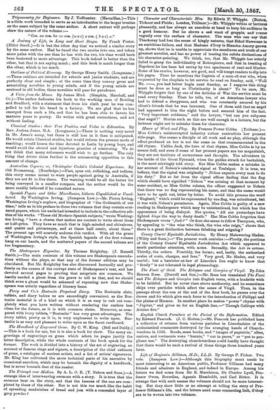Hours of Work and Play. By Frances Power Cobbe. (Trubner.)--
Miss Cobbe's uninterrupted industry rather contradicts her present title-page. She seems a disciple of all work and no play, although the effect produced on her is not the same as that commemorated in the old rhyme. Unlike Jack, the hero of that rhyme, Miss Cobbe is by no means dull, and even if some of her present papers are too magazinish, they are not destitute of earnestness and thought. The adventure in the inside of the Great Pyramid, when the guides struck for backshish, is the most stirringly told story. But Miss Cobbs makes a mistake in her account of Nelson's celebrated signal at Trafalgar. It is true, we belieye, that the signal was originally "Nelson expects every man to do his duty." But so far from the signal officer finding that the flag which should have signified "Nelson" was missing at that moment by some accident, as Miss Cobbe relates, the officer suggested to Nelson that there was no flag representing his name, and that the name would have to be spelt out, letter by letter. To avoid this process the word "England," which could be represented by one flag, was substituted, latt it was with Nelson's permission. Again, Miss Cobbe is guilty of a new reading in Shakespeare which may be unintentional, but which has the appearance of being disloyal. She quotes, "All our yesterdays have lighted Icings the way to dusty death." Has Miss Cobbe forgotten that Shakespeare wrote "fools?" Or does she mean to follow Tennyson, who, by appealing to "the wise who think, the wise who reign," shows that there is a great distinction between thinking and reigning ?


































 Previous page
Previous page